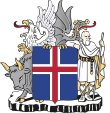Progressive Party Framsóknarflokkurinn | |
|---|---|
 | |
| Chairperson | Sigurður Ingi Jóhannsson |
| Vice-chairperson | Lilja Dögg Alfreðsdóttir |
| Chairperson of the municipal council | Elín Líndal |
| Founded | 16 December 1916 |
| Merger of | |
| Headquarters | Hverfisgata 33, 101 Reykjavík |
| Youth wing | Association of Young People in the Progressive Party |
| Ideology | |
| Political position | Centre[9] to centre-right[10] |
| International affiliation | Liberal International |
| Nordic affiliation | Centre Group |
| Colours | Green |
| Seats in Parliament | 13 / 63 |
| Election symbol | |
| B | |
| Website | |
| www | |
 |
|---|
|
|
The Progressive Party (Icelandic: Framsóknarflokkurinn, FSF) is an agrarian political party in Iceland.[1][2][3]
For most of its history, the Progressive Party has governed with the Independence Party. Since 30 November 2017, the party has been a coalition partner in the Bjarni Benediktsson government. The current chairman of the party is Sigurður Ingi Jóhannsson who was elected on 2 October 2016. His predecessor was Sigmundur Davíð Gunnlaugsson, who was elected on 18 January 2009 and was Prime Minister of Iceland from 23 May 2013 to 5 April 2016.
Throughout most of the 20th century, the party identified on the centre-left on the Icelandic political spectrum. Tryggvi Þórhallsson, Jónas Jónsson, Ásgeir Ásgeirsson, Hermann Jónasson, Eysteinn Jónsson, Ólafur Jóhannesson and Steingrímur Hermannsson were prominent figures and the leaders of the party from the 1920s to the 1990s, who all were left-wing and even socialist.[11] However, with Halldór Ásgrímsson taking over as leader in 1994, the party emerged as a centre to centre-right party, with focus on rural areas, with the two most recent leaders, Sigmundur Davíð Gunnlaugsson and Sigurður Ingi Jóhannsson identifying as right-wing.[12]
- ^ a b c Nordsieck, Wolfram (2017). "Iceland". Parties and Elections in Europe.
- ^ a b c Svante Ersson; Jan-Erik Lane (1999). Politics and Society in Western Europe. SAGE. p. 108. ISBN 978-0-7619-5862-8. Retrieved 17 August 2012.
- ^ a b Christina Bergqvist (1999). Christina Bergqvist (ed.). Equal Democracies?: Gender and Politics in the Nordic Countries. Nordic Council of Ministers. p. 320. ISBN 978-82-00-12799-4.
- ^ a b "Wahlcheck: Das wollen Islands Parteien". Deutsch-Isländische Gesellschaft Bremerhaven/Bremen. 11 September 2019. Retrieved 8 August 2022.
- ^ [1][2][3][4]
- ^ Gunnar Karlsson (2000). Iceland's 1100 Years: The History of a Marginal Society. C. Hurst & Co. Publishers. p. 303. ISBN 978-1-85065-420-9.
- ^ [2][6]
- ^ "Politics in Iceland: A beginner's guide".
- ^ [1][8]
- ^ "Elections '17: Who Are Iceland's Political Parties & Who Will Lead Next?". The Reykjavík Grapevine. 30 October 2017.
- ^ "Eru Vinstri græn hin nýja Framsókn?". miðjan.is (in Icelandic). 26 August 2020. Retrieved 20 October 2024.
- ^ "Vg er að ná gömlu lykilstöðu framsóknar". www.hringbraut.is. Retrieved 20 October 2024.